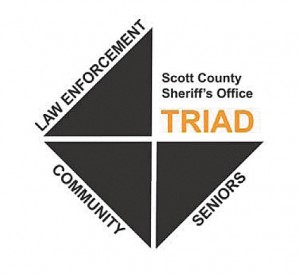July 1, 2016
News from Seniors And Law Enforcement Together (SALT)
Elder Abuse – Underreported and Under-recognized
 Iowa is an aging state. Iowa ranks 16th in population age 50 or older, with approximately 1.1 million Iowans age 50
Iowa is an aging state. Iowa ranks 16th in population age 50 or older, with approximately 1.1 million Iowans age 50
or older. Iowa also consistently ranks in the top five for the oldest population coming in at fourth place for population age 75 or older. Add to this the very rural nature of our state, and we become a breeding ground for abuse.
Elder abuse is underreported and under-recognized in Iowa, just as it is across the nation. The 2010 National Elder Mistreatment Study found one in ten seniors reports being abused, neglected or exploited in the past twelve months. Older Iowans experiencing health concerns or disabilities are more susceptible to exploitation and neglect. That’s because they depend on others and are often unable to adequately protect themselves or even think about escaping from an abusive situation.
The National Center on Elder Abuse (NCEA) reports that an incredible 90 percent of abusers are family members or “trusted others,” adding to the complexity of this already difficult situation.
What is elder abuse?
Here are some facts on elder abuse.
- Elder abuse includes physical abuse, emotional abuse, sexual abuse, exploitation, neglect, and abandonment. Perpetrators can include children, other family members, and spouses—as well as staff at nursing homes, assisted living, and other facilities.
- Physical abuse means inflicting physical pain or injury upon an older adult.
- Sexual abuse means touching, fondling, intercourse, or any other sexual activity with an older adult, when the older adult is unable to understand, unwilling to consent, threatened, or physically forced.
- Emotional abuse means verbal assaults, threats of abuse, harassment, or intimidation.
- Confinement means restraining or isolating an older adult, other than for medical reasons.
- Passive neglect is a caregiver’s failure to provide an older adult with life’s necessities, including, but not limited to, food, clothing, shelter, or medical care.
- Willful deprivation means denying an older adult medication, medical care, shelter, food, a therapeutic device, or other physical assistance, and exposing that person to the risk of physical, mental, or emotional harm—except when the older, competent adult has expressed a desire to go without such care.
- Financial exploitation means the misuse or withholding of an older adult’s resources by another.
hat are the warning signs of elder abuse?
- Physical abuse, neglect, or mistreatment: Bruises, pressure marks, broken bones, abrasions, burns
- Emotional abuse: Unexplained withdrawal from normal activities, a sudden change in alertness, or unusual depression; strained or tense relationships; frequent arguments between the caregiver and older adult
- Financial abuse: Sudden changes in financial situations
- Neglect: Bedsores, unattended medical needs, poor hygiene, unusual weight loss
- Verbal or emotional abuse: Belittling, threats, or other uses of power and control by individuals
What are the effects of elder abuse?
- Elders who have been abused have a 300 percent higher risk of death when compared to those who have not been mistreated. While likely underreported, elder financial abuse costs older Americans $2.9 billion per year. Yet, financial exploitation is self-reported at rates higher than emotional, physical, and sexual abuse or neglect.
How do I make an elder abuse report? - If you think that an older adult is in immediate, life-threatening danger, dial 911.
- If you suspect that an older adult is being mistreated, contact the Iowa Department of Human Services Dependant Adult Abuse hotline at 1-800-362-2178, 24 hours a day, seven days a week.
- If suspected dependent adult abuse is occurring in a health-related facility, contact the Iowa Department of Inspections and Appeals Nursing Home and Home Health Complaint Hotline at 1-877-686-0027.
- If you have concerns about your quality of care, quality of life or rights as a resident/tenant, or if you have concerns on behalf of your loved one who is living in one of Iowa’s long-term care facilities, contact the Office of the State Long-Term Care Ombudsman at 1-866-236-1430.
How can I help prevent elder abuse?
- Educating seniors, professionals, caregivers, and the public on abuse is critical to prevention. If you’re an older adult, you can stay safe by:
- Taking care of your health.
- Seeking professional help for drug, alcohol, and depression concerns and urging family members to get help for these problems.
- Attending support groups for spouses and learning about domestic violence services.
- Planning for your own future. With a power of attorney or a living will, you can address health care decisions now to avoid confusion and family problems later. Seek independent advice from someone you trust before signing any documents.
- Staying active in the community and connected with friends and family. This will decrease social isolation, which has been connected to elder abuse.
- Posting and opening your own mail.
- Not giving personal information over the phone.
- Using direct deposit for all checks.
- Having your own phone.
- Reviewing your will periodically.
- Knowing your rights. If you utilize the services of a paid or family caregiver, you have the right to voice your preferences and concerns. The Office of the State Long-Term Care Ombudsman advocates for residents and tenants of long-term care facilities, including nursing facilities, residential care facilities, assisted living programs and elder group homes. The ombudsman seeks to resolve complaints that impact the health, safety and welfare of residents and tenants, as well as by informing residents and tenants of their rights.
(Article taken from the Iowa Attorney General’s website)
Filed Under: Community, Finance, Retirement
Trackback URL: https://www.50pluslife.com/2016/07/01/news-from-seniors-and-law-enforcement-together-salt-14/trackback/


